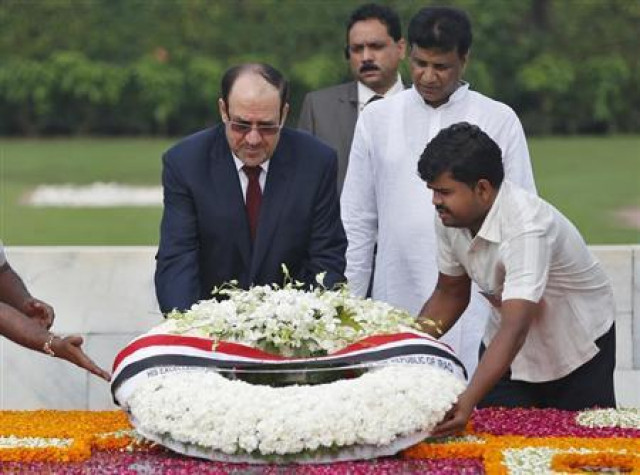Iraqi PM Maliki struggles to convince US lawmakers to back more aid
Maliki is on a visit to Washington, urgently seeking military supplies to fight militant groups in Iraq.

Iraqi Prime Minister Nuri al-Maliki (L) places a wreath at the Mahatma Gandhi memorial at Rajghat in New Delhi. PHOTO: REUTERS
Maliki is on his first visit to Washington in two years, urgently seeking US Apache attack helicopters and other military supplies to fight militant groups such as al Qaeda in Iraq as sectarian violence spills over the border from Syria.
But US officials, particularly members of Congress who take a harder line on many foreign policy issues than the Obama administration, have watched in dismay as Maliki has ignored Washington's calls to give Iraq's Sunni and Kurdish minorities a greater role in his Shia-led government, and moved closer to Iran since US troops left Iraq two years ago.
"The situation is deteriorating and it's unraveling, and he's got to turn it around," said Senator John McCain, one of the most influential foreign policy voices in the Republican party, after meeting with Maliki.
McCain was one of six Republican and Democratic senators who sent a letter to President Barack Obama on Tuesday taking a hard line against Maliki and blaming his government's actions for a rising tide of violence.
Maliki "too often" pursues a sectarian and authoritarian agenda, strengthening al Qaeda in Iraq, a Sunni militant group, and fueling violence between Sunnis and Shias, the senators wrote. The United Nations estimates that more than 7,000 civilians have been killed in Iraq this year.
"Frankly, he is not very happy about that letter," McCain said. "But.. (if) he expects this kind of assistance that he's asking for, then we need a strategy and we need to know exactly how that's going to be deployed, and we need to see some changes in Iraq."
The lawmakers are also angry about reports that Iran uses Iraqi airspace to send military assistance to Syrian President Bashar al-Assad in a civil war that has killed more than 115,000 civilians.
A senior Obama administration official said the administration believed the number of flights had decreased, although it has asked Maliki's government to improve its inspections.
"Right now, I don't think the inspection regime is airtight, but it is much better than what it was six months ago," the official said.
'Didn’t seem to digest' US concerns
Maliki's stops in Congress included his meeting with McCain and sessions with the leaders of the Senate Foreign Relations Committee and House Foreign Affairs Committee.
Senator Bob Corker, the top Republican on the Senate panel, who also signed the letter, said Maliki's visit had not been as productive as most with other international leaders.
"I don't think he seemed to internalize the concerns that we have about what's happening there. He didn't seem to digest that they are important to us, and I don't think it was a particularly healthy meeting," Corker said in a phone interview.
The administration official said the White House supported helping the Iraqis fight al Qaeda, but that it was up to Maliki and his delegation to make their case for support to Congress.
"I won't discuss the specific equipment requests, but we are working closely with Congress, and I know the Iraqi delegation will be on the Hill discussing it," the official said.
Separately, the official said delivery of F-16 fighters to Iraq was on track for next autumn, after Iraq deposited an installment of roughly $650 million for the jets.
Maliki met with Vice President Joe Biden on Wednesday morning. He was due to sit down with Defense Secretary Chuck Hagel on Thursday before meeting with Obama on Friday.
During their two-hour meeting, Maliki and Biden talked about the threats Iraq faces, and regional issues. The senior administration official said Syria was a "big" topic of conversation.
The last US troops left Iraq at the end of 2011, after eight years of war. Many Americans are disturbed about continuing violence in Iraq, and its closeness to US antagonist Iran, after spending billions of dollars and losing thousands of lives in the eight-year war that ousted dictator Saddam Hussein.
"It almost seems like after all the blood we lost and all the money we spent, that Iran seems to have more influence in Iraq than the United States does and that of course is a galling situation," said Representative Eliot Engel, the top Democrat on the House Foreign Affairs Committee.
But Engel said Maliki's meeting with him and Republican Representative Ed Royce, the committee chairman, had been friendly as they discussed a range of concerns.
"I think he stepped into a very difficult situation. He kept repeating that Iraqi democracy is not perfect, but it's a democracy," Engel said.



















COMMENTS
Comments are moderated and generally will be posted if they are on-topic and not abusive.
For more information, please see our Comments FAQ